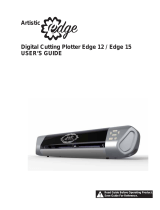
1
You can punch holes (dots) to create patterns by installing a paper piercing tool into your cutting machine. Use only paper as the
material.
This item is compatible with the Brother ScanNCut DX machine.
CHOKING HAZARD.
* This is not a toy and is not intended to be used by children. In order to prevent choking hazards, do not allow infants/children to put
the protective caps in their mouths.
• Before installing the paper piercing tool into the paper piercing tool holder or before installing the paper piercing tool holder into the
machine, remove the protective cap. After removing the holder from the machine or after removing the tool from the holder, be sure to
attach the protective cap. Do not leave the holder or tool with the needle exposed. Otherwise, injuries may result.
• Be sure to handle the paper piercing tool carefully so that no injuries occur.
In order to use the Paper Piercing function, it is necessary to update the software of the cutting machine to the latest version. For
detailed instructions on updating the machine, refer to the Operation Manual supplied with it.
● Do not insert any object other than the paper piercing tools into the paper piercing tool holder.
● Be sure to turn on the machine before installing the paper piercing tool holder. If the holder is installed while the machine is off,
the needle may break.
● Only pierce (punch holes in) paper with a thickness of 0.3 mm or less. Otherwise, the needle may break or be damaged.
● The cutting machine may not be able to pierce (punch holes in) some materials.
● The machine operation (hole size, shape, sounds, etc.) may differ under certain conditions.
● The paper piercing mat is compatible with paper piercing (hole punching), cutting and drawing.
● The paper piercing mat is incompatible with half-cutting and foiling.
● When drawing with the paper piercing mat, the material being drawn on may be damaged, depending on the shape of the pen
tip.
● If the adhesive strength of the paper piercing mat has decreased, lightly wipe the sheet with a wet wipe (alcohol-free
recommended), for example, to remove any dust or dirt. After wiping the mat, be sure to allow it to dry. If the mat becomes wet,
its surface will become brittle.
● If material can no longer be attached to the paper piercing mat, replace the mat with a new one.
● Do not store in a location exposed to direct sunlight, high temperatures or high humidity.
● Use in an environment between 10 °C and 35 °C (50 °F and 95 °F).
● For detailed instructions on using the cutting machine, refer to the Operation Manual supplied with it.
● The contents of this document are subject to change without notice.
● The screens shown in this manual may differ from the actual ones.
● The screen used in the explanation are displayed in mm.
Paper Piercing Starter Kit
About the Paper Piercing Starter Kit
Important Safety Instructions
Precautions
Version 0


















